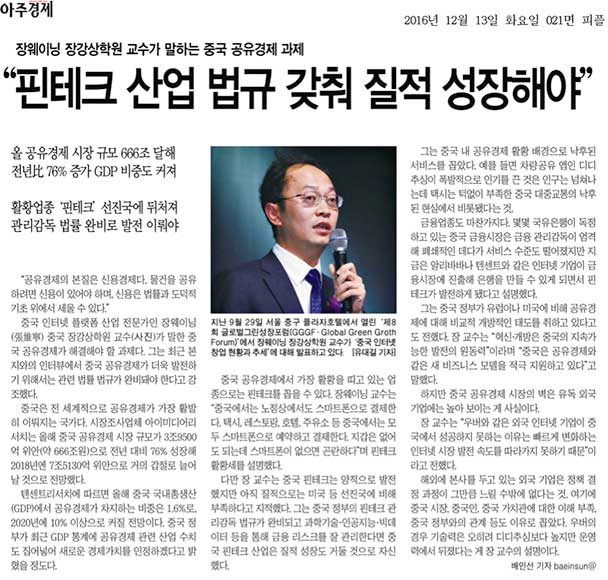CKGSB Professor Zhang Weining says China needs an updated legal system in order for the sharing economy—one of the most thriving parts of China’s economy—to fully mature, according to a recent interview with Aju Business Daily, Korea’s renowned business daily known for its China-focused articles.
“The fundamental issue of the sharing economy lies on a credit-based economy, as credit is a must-have factor in sharing things,” said Prof. Zhang, whom the paper referred to as an expert in the Chinese internet platform industry. “The levels of credit can be established based on the legal system and a moral basis,” he said.

Professor Zhang Weining shared his insights about the sharing economy in China during
an interview with Aju Business Daily in Seoul on Dec. 7
Prof. Zhang named China’s service industry—which has remained relatively underdeveloped compared to the explosive growth in demand—as the key contributing factor that resulted in the sharing economy’s success in China. A prime example is Didi Chuxing, a successful car hailing app company operated by CKGSB alumni, that solved China’s chronic transportation problem, he added.
Fintech is the most thriving sector in China’s sharing economy, he said. “In China, people make payments and reservations with smartphones everywhere, for taxis, restaurants, hotels, gas stations, and even to street vendors,” he explained. “You’re good to go without your wallet, but not without a smartphone.”
Despite such rapid quantitative expansion, Zhang pointed out that it is time for China to focus on qualitative development in its fintech market which he says needs a long way to go compared to developed economies like the US. The government has to develop a current legal system to supervise the market and risk management systems using latest technologies like artificial intelligence (AI) and Big Data, he suggested.
But Zhang remained optimistic about the future of China’s sharing economy, saying that the government has a more open-minded attitude on the sharing economy than the US or European countries. “Open innovation is the growth engine for China’s sustainable growth,” Zhang said. “The government is actively supporting new businesses models including those in the sharing economy sector.”

Professor Zhang Weining introduced Didi Chuxing as a successful case
within China’s sharing economy
To read the original Korean article by Aju Business Daily, please click here.